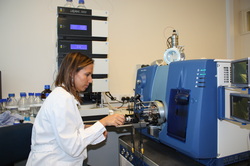Proteomic discovery of serum biomarkers in metastatic uveal melanoma
Dr Martina Angi
Dr Helen Kalirai
Prof. Sarah Coupland
Prof. Bertil Damato
Summary
In patients with uveal melanoma clinically evident metastatic disease is almost invariably refractive to current treatment strategies. Earlier detection of metastatic disease may potentially increase the effectiveness of such therapies. Moreover, an effective strategy would be to suppress micro-metastases before they progress, adopting systemic therapy in the adjuvant setting for high risk patients. As metastatic spread occurs haematogeneously, a sensitive and specific serological marker that can be measured on routine blood samples would allow earlier detection of metastatic disease and aid monitoring of systemic adjuvant therapy in high risk uveal melanoma patients. This study aims to identify such a biomarker(s) of metastatic disease by focusing on both the secretome of the primary tumour and circulating tumour cells.
Dr Helen Kalirai
Prof. Sarah Coupland
Prof. Bertil Damato
Summary
In patients with uveal melanoma clinically evident metastatic disease is almost invariably refractive to current treatment strategies. Earlier detection of metastatic disease may potentially increase the effectiveness of such therapies. Moreover, an effective strategy would be to suppress micro-metastases before they progress, adopting systemic therapy in the adjuvant setting for high risk patients. As metastatic spread occurs haematogeneously, a sensitive and specific serological marker that can be measured on routine blood samples would allow earlier detection of metastatic disease and aid monitoring of systemic adjuvant therapy in high risk uveal melanoma patients. This study aims to identify such a biomarker(s) of metastatic disease by focusing on both the secretome of the primary tumour and circulating tumour cells.




